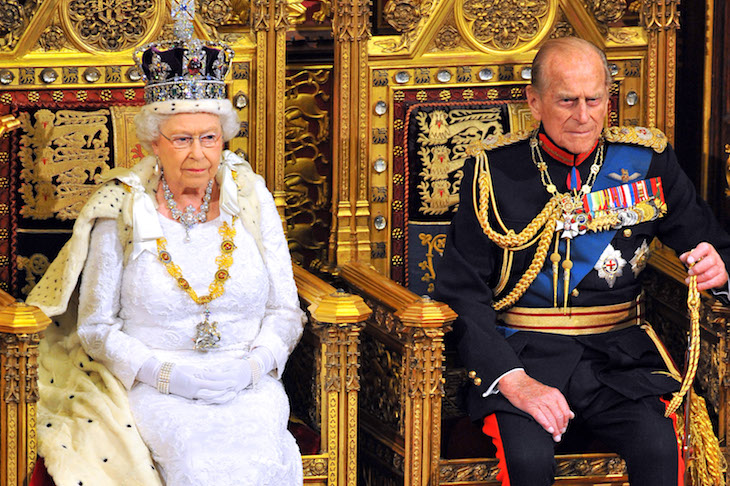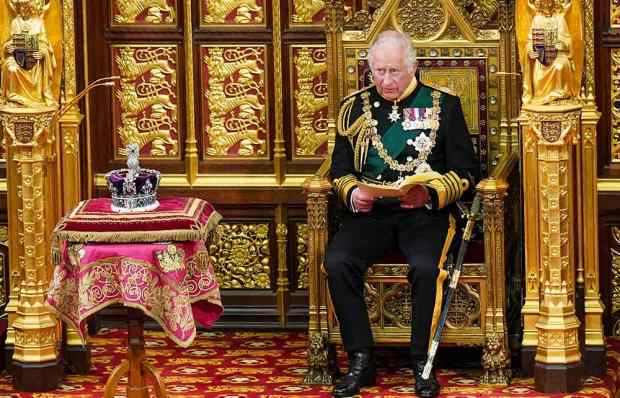Windsor Castle on Monday night sounds like a children’s party magnified. The rooms were filled with golden-leaved trees. A giant block of ice carved with the initials of the Queen on one side and the Duke of Edinburgh on the other dominated the reception room. Her sons wore their Windsor coats. A magician made a table levitate and move unsupported round the room. As with a children’s party, there were no speeches, and everyone was pleased and excited. After 70 years married, the two nonagenarians involved presumably felt, among family and friends, that they had earned the right to be unserious. The occasion must have been sweet for Prince Philip. All those years ago, he was patronised. When he was newly engaged, someone at Windsor said to him, ‘You’ll soon get fond of this place.’ ‘Actually, my mother was born here, you know,’ he replied — spikily, but truthfully. On another occasion long ago, he burst out, ‘Why am I regarded as a foreigner? I fought for this country in the war.’ He did indeed, and is now almost the last such in our public life. In middle age, he noted to a friend of mine that people had been fascinated by the Queen in her youth, and then took her for granted, ‘But they’ll be interested again when she is old.’ They are, in both of them together.
For a very long time, Angela Merkel successfully appealed to the post-war German longing for consensus. She hugged potential rivals in her motherly embrace. The rise of Alternative für Deutschland (AfD) makes this much more difficult. As its name suggests, it really does offer something different. Given its pariah status, people assumed that parties would happily coalesce against it after its electoral breakthrough. But in fact its presence opens up two big discontents — mass immigration and energy prices — forcing other parties to consider their positions. Immigration gets most of the headlines here, but the energy issue is almost equally problematic. Germany’s consumers have to pay huge bills because of their government’s determination to go green. The country’s carbon emissions are ordered to fall by 40 per cent from their 1990 level by 2020 — Mrs Merkel’s target being twice as exacting as that of the EU. This is unachievable, but even the process of failing to achieve it is shockingly expensive, and lays the country open to massive dependence on Russian gas. The refusal to use Germany’s plentiful coal to give the country cheap energy is controversial, especially in the former East Germany, where AfD is strong. In the election campaign, the FDP (Liberal party) made strong noises against high energy prices. It dare not unsay them all now in order to enter coalition. In the current revolt against the elites in the West, few issues more divide the many from the few than energy prices and the bogus religion which is forcing them up. Strange that this issue should give the right its chance.
Just over two years ago, the Church of England authorities hurriedly condemned George Bell because of claims that he had abused a child nearly 70 years ago. They paid money to the alleged victim. Bell, Bishop of Chichester and the leading British supporter of Christian resistance to Hitler, died in 1958. Many protested at the process by which Bell had been condemned. No contemporary documents seemed to have been studied and no surviving witnesses, such as his domestic chaplain, had been asked for their testimony. The mere accusation carried all before it. So great was the anger that the Archbishop of Canterbury courageously decided to review the decision to which he had been party and called in Lord Carlile QC to review the process which damned Bell. Lord Carlile reported in early October, and the steer was that the church would release his report roughly now. On Monday, however, a C of E press release said that the authorities ‘are at the stage of responding with feedback from those who contributed’. ‘This is the process with all independent reviews, there is a period of a few months between receiving the first draft and final publication,’ it explained. A few months! Obviously those criticised should be allowed to comment privately on what the report says, but there was only one accuser and only one supposed perpetrator. This is not the Chilcot report. Two thoughts occur. The first is that the delay strongly suggests that Lord Carlile has found the process to have been severely wanting. The second is that the ‘safeguarding’ team at the heart of the process are being much better safeguarded than ever poor Bell was.
An old idea takes new form. Once upon a time, the ‘Varsity Line’ linked Oxford and Cambridge by rail. The line was severed in 1967, and I vaguely remember people laughing at the old-fashioned intellectual snobbery that must have lain behind the link. Ten years ago, when I was chairman of the think-tank Policy Exchange, we published a pamphlet called Cities Unlimited, which advocated the expansion of knowledge-based cities and their ‘connectivity’. Oxford and Cambridge were cited. David Cameron, then leader of the opposition, repudiated it, partly because the suggestion involved building houses in Tory constituencies. Now the idea is back, sounding ever more modern. People want a ‘brain belt’ joining Oxford, Milton Keynes and Cambridge. The rail link could quite easily be reconnected because of the reopening of the Oxford to Bicester Junction section of the Chiltern Line to Marylebone. As Eliot put it, ‘Time future [is] contained in time past.’
A recent email via the Young Vic, inviting directors to apply for an interview for a play called Dead and Breathing, says: ‘Because of the nature of the production, applicants who identify as BAME, trans or gender queer will be guaranteed an interview. Please state this clearly in your application.’ Imagine an advertisement which stipulated that the ‘nature of the production’ would guarantee a straight, white man an interview. It would be against the law.
Got something to add? Join the discussion and comment below.
Get 10 issues for just $10
Subscribe to The Spectator Australia today for the next 10 magazine issues, plus full online access, for just $10.
You might disagree with half of it, but you’ll enjoy reading all of it. Try your first month for free, then just $2 a week for the remainder of your first year.















Comments
Don't miss out
Join the conversation with other Spectator Australia readers. Subscribe to leave a comment.
SUBSCRIBEAlready a subscriber? Log in